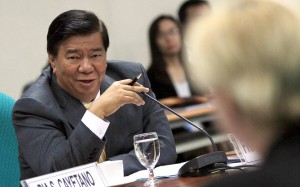Philippine News
Drilon supports redefining budgetary savings through a law
MANILA — Senate President Franklin Drilon on Monday said he is in favor of filing a separate bill that will redefine budgetary savings and govern its use.
”Since the executive department and the Supreme Court have different opinions about the definition of savings, I’m in favor of clarifying it through a law,” Drilon said in a media interview before Monday’s session.
Drilon, however, said the Senate might also adopt if the House of Representatives will consider the savings an appropriations matter under the proposed P2.606-trillion national budget for 2015.
”We will study further. It is entirely possible that we do it simultaneously,” he said.
Meanwhile, Senator Juan Edgardo Angara said Congress should “codify” laws, rules including “best practices and reforms” on public sector budgeting instead of piecemeal amendments to budget laws.
“The time has come to revisit all laws on public expenditures,” Angara said, explaining that the two principal laws guiding budgeting were conceived “when desktop computers were still alien in the bureaucracy.”
The senator, who is a lawyer by profession, was referring to the 37-year-old Presidential Decree 1177, issued by then President Ferdinand Marcos in 1977, and Executive Order 292, or the Administrative Code of 1987, which came into force a year after then President Corazon Aquino assumed power.
“In fact, according to budget experts, whole sections of PD 1177 were attached to the Administrative Code. To a large degree, the portion on national government budgeting, which is Book VI, was copy-pasted from PD 1177,” Angara said.
He also noted that the two measures were “executive issuances.”
“They were not products of the legislative branch, but by a presidency possessing lawmaking powers,” he said.
“But that should not be the excuse for consolidating all laws pertaining to government budgeting under one code.
The main reason should be the wealth of experiences, reforms, initiatives, lessons of the Philippine budgeting system,” Angara pointed out.
“For example, in 1987 when the present Administrative Code took effect, the national budget was P121 billion. It has grown by 21-fold since. For next year, the proposed budget is P2.6 trillion,” he said.
Another factor which was not there when the two budget laws were drafted is the revolution in information technology, Angara said.
He explained that judicial decisions on budget aspects, such as the nullification of certain acts of Disbursement Acceleration Program (DAP) and Priority Development Assistance Fund (PDAF), might also require some corresponding adjustments in the law.
“There is also the need to future-proof the budget against an executive branch who will treat the “treasury as its own personal piggy bank,” the neophyte senator said.
For his part, Senator Ralph Recto said savings should instead be used to reduce the deficit or pay down the debt.
”We will debate that (savings) here now. I have conservative view on savings. Let’s reduce deficit. I think that is a noble objective,” he said.
Recto said he cannot fight with the Supreme Court (SC) on the definition of savings.






















